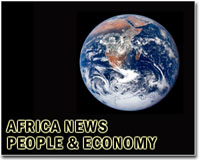| . |  |
. |
Doha, Qatar (UPI) May 28, 2010 China is negotiating with the Persian Gulf state of Qatar to sell an additional 10 million tons of liquefied natural gas a year, on top of the 5 million it already buys. This is part of Beijing's drive to establish strategic energy links with Middle Eastern states as it has done in mineral-rich Africa over the last few years, challenging U.S. dominance of the oil-rich strategic region since World War II. Slowly, China is expanding its political and economic footprint across the region, with deals in Saudi Arabia, which now exports more oil to Asia than it does to the United States, and, among other projects, railroad contracts worth $2 billion in energy-rich Algeria. "China is forging strong ties with regional powers and gradually challenging U.S.-Israeli dominance," says Iranian analyst Richard Javad Heydarian. "Thanks to decades of double-digit economic growth and accelerating military modernization, China now has both the need and the capability of engaging the Middle East "The Middle East was a staging area for Cold War conflicts between the United States and the Soviet Union," Heydarian wrote in an analysis for Asia Times Online. "Will the region become a battleground in the 21st century conflict between a rising China and a stagnant United States?" If the Qatar deal goes through, China will become the gulf emirate's biggest customer, overtaking Japan, which buys about 8 million tons annually. India, which like China has an economy that continues to expand despite the global meltdown, is also a major customer, reflecting Asia's growing importance to the Persian Gulf region. It is negotiating to buy 4 million tons of Qatari LNG a year. These deals would involve diverting LNG that for the most part currently goes to the United States and Europe, Qatari Energy Minister Abdullah bin Hamad al-Attiyah says. But it is Iran and Saudi Arabia, traditional rivals for dominance of the gulf, that are central to Beijing's blueprint for penetrating the Middle East. Saudi Arabia's huge energy reserves, the world's largest, are vital to China's economic strategy. In 2009, Beijing approved a joint venture between Sinopec and the Saudi Basic Industries Corp. to build a $3 billion petrochemical complex in Tianjin in eastern China, the country's sixth largest city. Sabic, the kingdom's largest methanol exporter and 70 percent owned by the Riyadh government, plays a key role in the growing market in China for Saudi petrochemical companies. China buys 840,000 tons of methanol a year out of the total Saudi production of 6.2 million tons. That was worth $2 billion in 2008 and is expected to grow, despite recent Chinese accusations of Saudi dumping. "Flushed with cash and clout, Beijing is changing the regional balance of power even as a relative newcomer to the Middle East," Heydarian observed. "Washington, meanwhile, is too distracted by its wars to do much more than observe the tectonic shifts." Over the last five years, China has become a major investor in the Islamic Republic, with an estimated $120 billion in energy investments alone. Trade increased 35 percent to $27 billion in 2008. "China's burgeoning ties with Iran are not really surprising," says Heydarian. "Iran is host to the second largest reserves of oil and natural gas. "It is also a traditional regional power, with a huge network of allies and proxies across the region. "For Iran, faced with increasing investment vacuum and international isolation over its nuclear program, China represents a potential remedy for development of its vast energy resources and a source of modern military technology. "China sees Iran as a counter-force to U.S. allies in the region and has contemplated establishing a naval presence in the Persian Gulf, where 40 percent of global energy is transported." The Chinese have exploited growing antipathy toward the United States across the Middle East, stemming largely from its unstinting support for Israel and its perceived war on Islam since Sept. 11, 2001. Since 9/11, the Saudis have been visibly moving from their traditional alliance with the Americans and looking increasingly eastward for new connections. But the China link predated al-Qaida's 2001 attacks. In 1986, unknown to Washington, Riyadh purchased an estimated 50 CSS-2 ballistic missiles from China as a counter to what it saw as an Iranian threat because Washington wouldn't supply it with such weapons.
Share This Article With Planet Earth
Related Links Africa News - Resources, Health, Food
 Chad boots out U.N. force, faces crisis
Chad boots out U.N. force, faces crisisN'Djamena, Chad (UPI) May 26, 2010 Violence-ridden Chad, one of the world's poorest and most corrupt states, is on the brink of a humanitarian disaster after its government demanded the U.N. Security Council withdraw a 3,300-strong peacekeeping force. U.N. officials said Sunday that 2 million people - 18 percent of the population - face famine in the central African state and will be even more vulnerable once U.N. troo ... read more |
|
| The content herein, unless otherwise known to be public domain, are Copyright 1995-2010 - SpaceDaily. AFP and UPI Wire Stories are copyright Agence France-Presse and United Press International. ESA Portal Reports are copyright European Space Agency. All NASA sourced material is public domain. Additional copyrights may apply in whole or part to other bona fide parties. Advertising does not imply endorsement,agreement or approval of any opinions, statements or information provided by SpaceDaily on any Web page published or hosted by SpaceDaily. Privacy Statement |